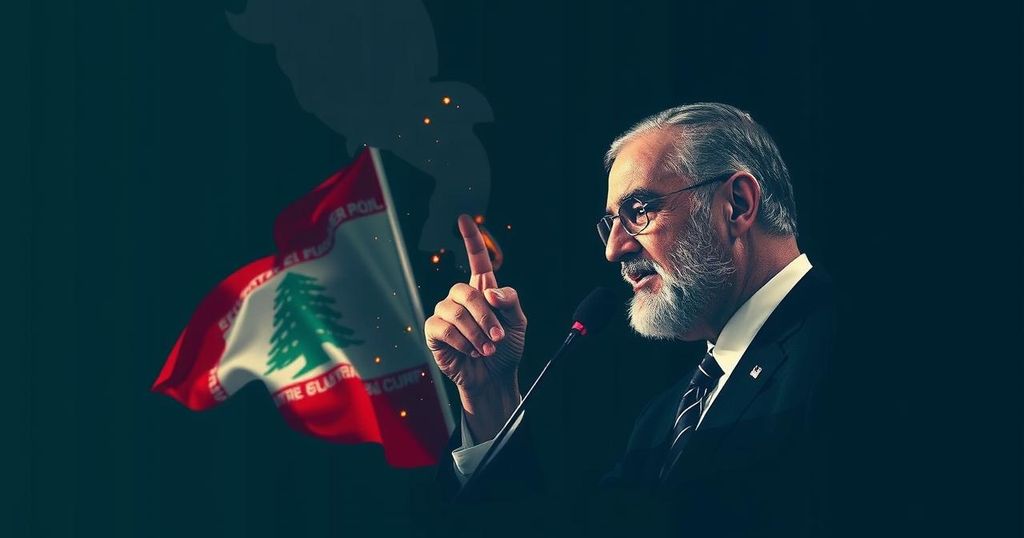Global news
AIR DEFENSE, ASIA, BASHA, BASHAR AL - ASSAD, BENJAMIN NETANYAHU, CONFLICT, GAZA, GAZA STRIP, HAMAS, HASSAN NASRALLAH, HEZBOLLAH, IDF, IRAN, ISLAMIC REPUBLIC, ISRAEL, ISRAEL DEFENCE FORCES, LEBANON, MIDDLE EAST, MIDDLE EAST AFFAIRS, MILITARY OPERATIONS, NORTH AMERICA, RETALIATION, TEHRAN, UNITED STATES
Fatima Khan
0 Comments
Ceasefire in Lebanon: A Pivotal Moment for Iran and Its Regional Ambitions
The ceasefire between Israel and Hezbollah signals a strategic decline for Iran, whose support for militant groups has been undermined by Israel’s successful military operations. The situation reveals increasing pressures within Iran, as domestic dissatisfaction rises amidst economic crisis. Shifts in geopolitical dynamics raise questions about the future roles of Hezbollah and Iran in ongoing conflicts in the region, indicating a potential reevaluation of strategies going forward.
The recent ceasefire between Israel and Hezbollah in Lebanon signifies more than just the end of violence; it constitutes a considerable setback for Iran, the main supporter of Hezbollah. This conflict was ignited by Hezbollah’s persistent missile strikes on Israeli civilians, which Iran orchestrated to demonstrate support for Hamas following its attacks on October 7. Despite Iran’s efforts to maintain control over its proxies, it has suffered significant humiliation as the Israeli Defense Forces have systematically dismantled Hezbollah’s key military infrastructure and executed targeted strikes against its leaders.
Iran’s strategy has long involved financing and arming terrorist factions like Hezbollah and Hamas to engage in proxy warfare against Israel. The ongoing violence, however, has left the Iranian regime vulnerable, as it struggles to retain regional influence amidst increasing internal dissent and economic hardship. Recent developments suggest that Iranian leadership has initiated efforts for a cessation of hostilities, fearful of further diminishing its standing should the conflict escalate.
Hezbollah’s reluctance to fully embrace peace has been evident, with the group continuing its rocket attacks against Israel until just moments before the ceasefire took effect. This ongoing militancy showcases the tension between Hezbollah’s ambitions and Iran’s revised strategy aimed at stabilizing its position. The outcome of this ceasefire will depend heavily on Hezbollah’s commitment to refrain from further aggression, which has drawn warnings from Israeli officials about the firm response they will employ to counter any resurgence of hostilities.
Moreover, as Hezbollah grapples with the ramifications of its increasing isolation from Iran, it faces pressure to justify its military actions amidst accusations of negligence toward its obligations to its allies in Gaza and Lebanon. As Iran’s position as a regional power deteriorates, the Lebanese government’s potential deployment of military forces along the southern border could further undermine Tehran’s influence, showcasing a shift in responsibility from Iranian proxies to sovereign forces.
The broader implications of these developments may signal the beginning of significant turbulence for the Iranian regime. As inflation and unemployment soar within Iran, dissenting voices are rising, advocating for a reevaluation of national priorities over foreign military engagements. Facing a more hardline U.S. administration soon, Iran must navigate an increasingly complicated landscape, where its strategic ambitions appear threatened by both internal and external pressures.
The article discusses the recent ceasefire agreed upon between Israel and Hezbollah, framing it as a strategic setback for Iran, which has backed Hezbollah in its hostilities. The ongoing conflict in the Middle East has seen Iran engage through proxies, primarily in response to perceived threats from Israel and the need to support groups such as Hamas. The dynamics of this proxy warfare reveal deep-rooted tensions in the region, especially regarding Iran’s declining influence as internal and external pressures mount.
In conclusion, the ceasefire in Lebanon marks a pivotal moment not only for regional stability but also for Iran’s geopolitical standing. As Israeli forces have successfully targeted Hezbollah’s military structures, Iran finds itself grappling with significant losses on multiple fronts. The Iranian leadership’s choice to halt hostilities indicates a recognition of its diminished power, compounded by internal discontent and worsening economic conditions. The future of Hezbollah and the potential for enduring peace will depend largely on the group’s ability to adapt to this evolving landscape, which has been reshaped by their loss of regional leverage.
Original Source: www.telegraph.co.uk




Post Comment